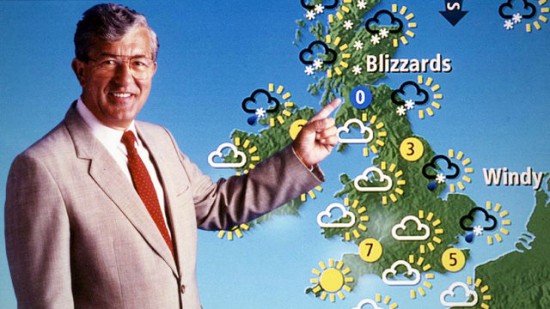
Saturday November 6th at 8pm on BBC Radio 4.
from the BBC website:
The author Iain Sinclair presents a timely illustrated essay on that uniquely British obsession – the weather. Why has the seemingly-mundane weather forecast been an obsession for listeners and viewers since the early days of broadcasting? What does it tell us about our national character and the role of broadcasting in our lives?
The first weather forecasts lasted five minutes and resembled a military briefing. Today they last a couple of minutes but viewers barely pay any attention, they recall little of what the forecasters said. Weather forecasters call for more time but does anyone place too much faith in the BBC’s weather forecast anymore?
We’ll hear from the forecasters – Michael Fish, Bill Giles and Sian Lloyd – what does it mean to be at the forefront of the British public’s interaction with their favourite subject?
Along the way we’ll hear evocative archive of extreme weather events like: floods of ’53, hard winter of 63, red rain in ’68, summer of ’76 and the gales of ’87.
Messing with the weather is a tricky business. The latest style of TV graphics, the infamous tilting map called the fly over, caused disapproval up and down the country. Why was our Pleasant Land coloured brown not green? Proud Scots protested that their country appeared diminished- surely another example of bias from the South East of England?
Iain will ask what role the weather plays in our culture – any writer purposefully tuned to the language of the moment will be obliged to employ the weather as a moral sub-text, a framing device, a ceiling of depression – weather as prediction. Weather as a liquid mirror in which the writer, reads our future. A curious link develops between the great winds of 16 October 1987 and the collapsing financial markets on “Black Monday.”
Producer: Barney Rowntree